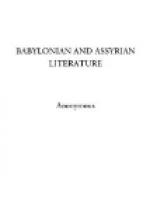112 the soldiers of the land of Nirbi I slew in fight in the
desert; their spoil, their oxen, their sheep, I brought away;
Nirbu which is at the foot of mount Ukhira
113 I boldly took; I then passed over to Tila their fortified city;
from Kinabu I withdrew; to Tila I drew near;
114 a strong city with three forts facing each other: the soldiers
to their strong forts and numerous army trusted and
would not submit;
115 my yoke they would not accept; (then,) with onset and
attack I besieged the city; their fighting men with my
weapons I destroyed; of their spoil,
116 their riches, oxen and sheep, I made plunder; much booty
I burned with fire; many soldiers I captured alive;
117 of some I chopped off the hands and feet; of others the
noses and ears I cut off; of many soldiers I destroyed the
eyes;[29]
118 one pile of bodies while yet alive, and one of heads I reared
up on the heights within their town; their heads in the midst
I hoisted; their boys
(Continued on Column II.)
[Footnote 1: Ninip was one of the great gods of the Assyrian Pantheon, often joined with Assur as one of the special deities invoked by the Assyrian kings at the opening of their inscriptions. His name is also written under the symbol used for iron ("parzii"). Thus in later times the planets were connected with special metals.]
[Footnote 2: A goddess, called also Nuha, and the mother of Nebo as well as of Ninip. Fox Talbot (Gloss. 158) compares “nu (= ‘al’) kimmut” with the “al-gum” of Prov. xxx. 31, i.e., “irresistible.”]
[Footnote 3: Planets. Or, “warrior among spirits.” I mention this rendering as the suggestion of Mr. G. Smith, though I prefer that given above.]
[Footnote 4: Literally, “horn.” Cf. Job xvi. 15.]
[Footnote 5: Tigallu. Menant renders this sentence “La massue pour regner sur les villes.”]
[Footnote 6: Cf. Ps. xxiv. 8.]
[Footnote 7: Cf. Ps. xcv. 4; civ. 6; cvii. 35.]
[Footnote 8: Probably the Dagon of Scripture.]
[Footnote 9: Compare the boast in Isaiah xxxvii. 24, “I cut down the tall cedars.”]
[Footnote 10: Goings. Cf. Ps. xl. 2, “He hath established my goings.”]
[Footnote 11: Mouth.]
[Footnote 12: The god Yav may be the Yaveh of the Moabite stone.]
[Footnote 13: Or, shade. This may refer to the eclipse of July 13, 885 B.C.]
[Footnote 14: A federation of States north and northeast of Assyria at the head of the Euphrates. In Tig. iv. 7, 33 of their kings are mentioned.]
[Footnote 15: Literally, “animals of the East.” This looks as if the Assyrians obtained the horse from some Eastern land.]
[Footnote 16: Or, a viceroy.]
[Footnote 17: A mountainous country near the upper Tigris, possibly Kurdistan.]




